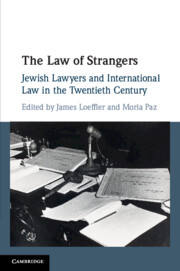Book contents
- The Law of Strangers
- The Law of Strangers
- Copyright page
- Dedication
- Contents
- Acknowledgments
- About the Contributors
- Introduction
- Part I Hersch Zvi Lauterpacht
- Part 2 Hans Kelsen
- 3 Assimilation through Law
- 4 Philosophy beyond Historicism
- Part 3 Louis Henkin
- Part 4 Egon Schwelb
- Part 5 René Cassin
- Part 6 Shabtai Rosenne
- Part 7 Julius Stone
- Index
4 - Philosophy beyond Historicism
Reflections on Hans Kelsen and the Jewish Experience
from Part 2 - Hans Kelsen
Published online by Cambridge University Press: 01 July 2019
- The Law of Strangers
- The Law of Strangers
- Copyright page
- Dedication
- Contents
- Acknowledgments
- About the Contributors
- Introduction
- Part I Hersch Zvi Lauterpacht
- Part 2 Hans Kelsen
- 3 Assimilation through Law
- 4 Philosophy beyond Historicism
- Part 3 Louis Henkin
- Part 4 Egon Schwelb
- Part 5 René Cassin
- Part 6 Shabtai Rosenne
- Part 7 Julius Stone
- Index
Summary
While Kelsen never denied his Jewish origins, Lieblich provides indisputable evidence that he rejected both anti-Semitic and Zionist attempts to label his thought “Jewish.” More importantly, Lieblich moves beyond biography to show that the monism of Kelsen’s Pure Theory is an attempt to assimilate the individual into the international community. Lieblich’s analysis illuminates a tension, if not a paradox, that is at the heart of Kelsen’s legal theory, and his conception of international law especially, which is the undeniable appeal to progress embedded within the purported ideological purity of the Pure Theory of Law.
- Type
- Chapter
- Information
- The Law of StrangersJewish Lawyers and International Law in the Twentieth Century, pp. 82 - 90Publisher: Cambridge University PressPrint publication year: 2019

